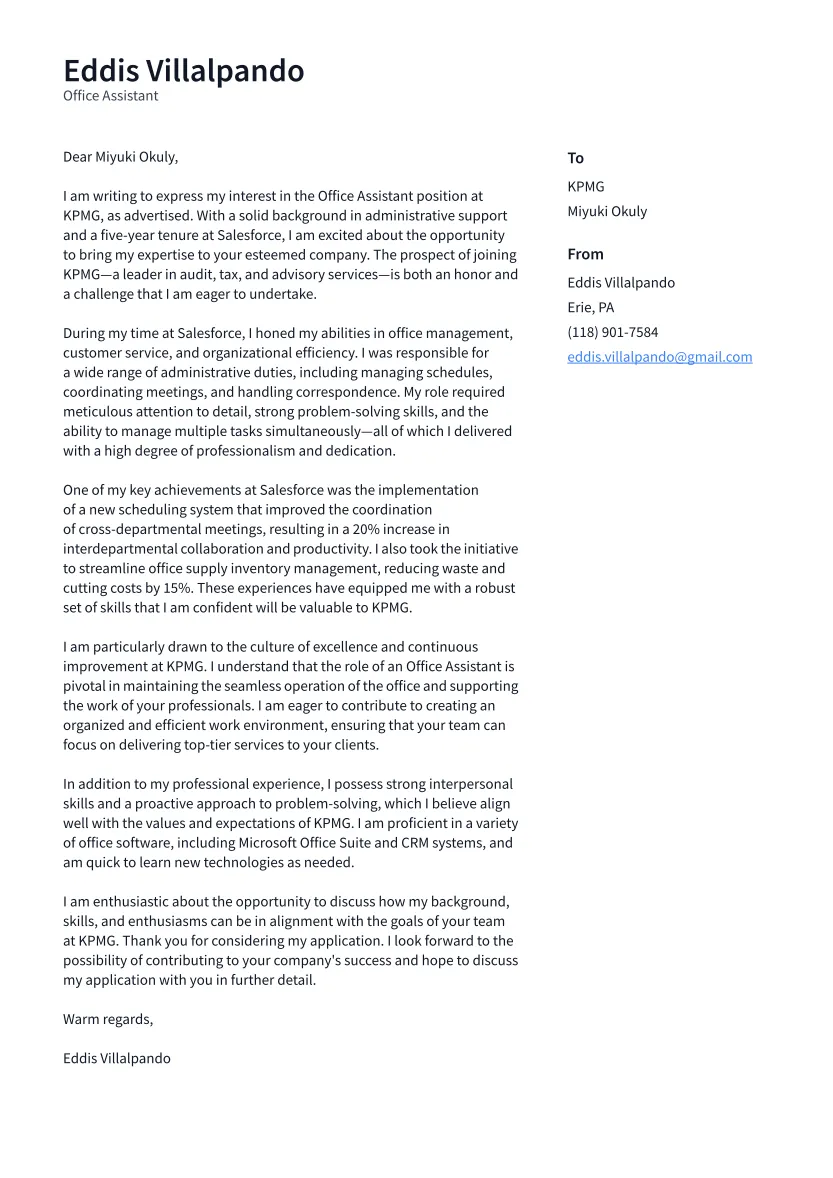Why a Cover Letter Matters for Office Assistant Jobs
In the competitive landscape of job applications, a well-crafted cover letter can be the key to unlocking your dream office assistant position. It serves as your first introduction to a potential employer, offering you the opportunity to make a lasting positive impression. While your resume provides a snapshot of your experience and skills, a cover letter allows you to provide context, showcase your personality, and explain why you’re the perfect fit for the role and the company. Ignoring the cover letter can be a detrimental mistake. A compelling cover letter can separate you from other candidates, demonstrating genuine interest and attention to detail. It enables you to address specific job requirements, highlight achievements that align with the position, and express your enthusiasm. By skillfully combining your qualifications with a personalized approach, you create a powerful tool that significantly increases your chances of getting an interview.
Highlighting Your Skills in Your Office Assistant Cover Letter
Your cover letter is a stage to showcase your relevant skills and how they align with the office assistant role. Instead of merely listing your abilities, go a step further by providing concrete examples of how you’ve utilized these skills to achieve positive outcomes in past roles. Quantify your achievements whenever possible; for example, mention how you improved office efficiency by streamlining a specific process. This approach transforms your claims from generic statements into compelling evidence of your capabilities. When tailoring your cover letter, closely examine the job description to determine the most critical skills the employer seeks. Then, weave these skills into the narrative of your letter, ensuring that each example you provide directly addresses the employer’s needs. This strategic approach makes your cover letter more impactful, highlighting your ability to succeed in the office assistant position.
Key Skills to Showcase in Your Cover Letter
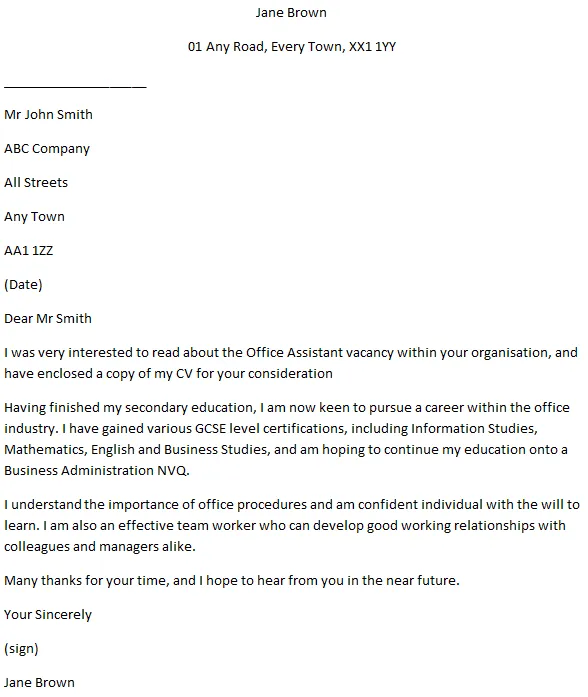
Office assistant positions require a diverse set of skills. Your cover letter should spotlight these to demonstrate your suitability for the role. Focus on areas where you excel and have demonstrable achievements to back up your claims. This will not only make your application more appealing but also underscore your competency. Remember to tailor the skills you highlight based on the job description, ensuring that the abilities you emphasize align with the employer’s expectations. Carefully selecting and presenting the most relevant skills is an excellent way to show how you can contribute and succeed as an office assistant.
Administrative and Organizational Abilities
Administrative and organizational skills are the backbone of an office assistant’s role. Your cover letter should highlight your proficiency in managing administrative tasks, such as scheduling appointments, organizing files, and handling correspondence. Showcase your ability to maintain a well-organized workspace and efficiently manage office resources. Mention specific instances where you’ve implemented organizational systems or streamlined administrative processes to improve efficiency. For example, you might discuss how you implemented a new filing system that reduced document retrieval time by a certain percentage. Demonstrating your organizational skills directly benefits the hiring company, as it indicates your potential to contribute to a smoother, more productive work environment.
Communication and Interpersonal Skills
Office assistants often serve as the first point of contact for the company, so strong communication and interpersonal skills are crucial. In your cover letter, emphasize your ability to communicate clearly and professionally, both in writing and verbally. Provide examples of how you’ve handled phone calls, emails, and in-person interactions. Highlight your active listening abilities and your capacity to build rapport with colleagues and clients. Mention any experience resolving conflicts or addressing customer concerns. Employers value candidates who can represent the company in a positive and professional manner. Effectively communicating your skills in these areas in your cover letter can significantly improve your chances of making a positive impression.
Technical Proficiency and Software Skills
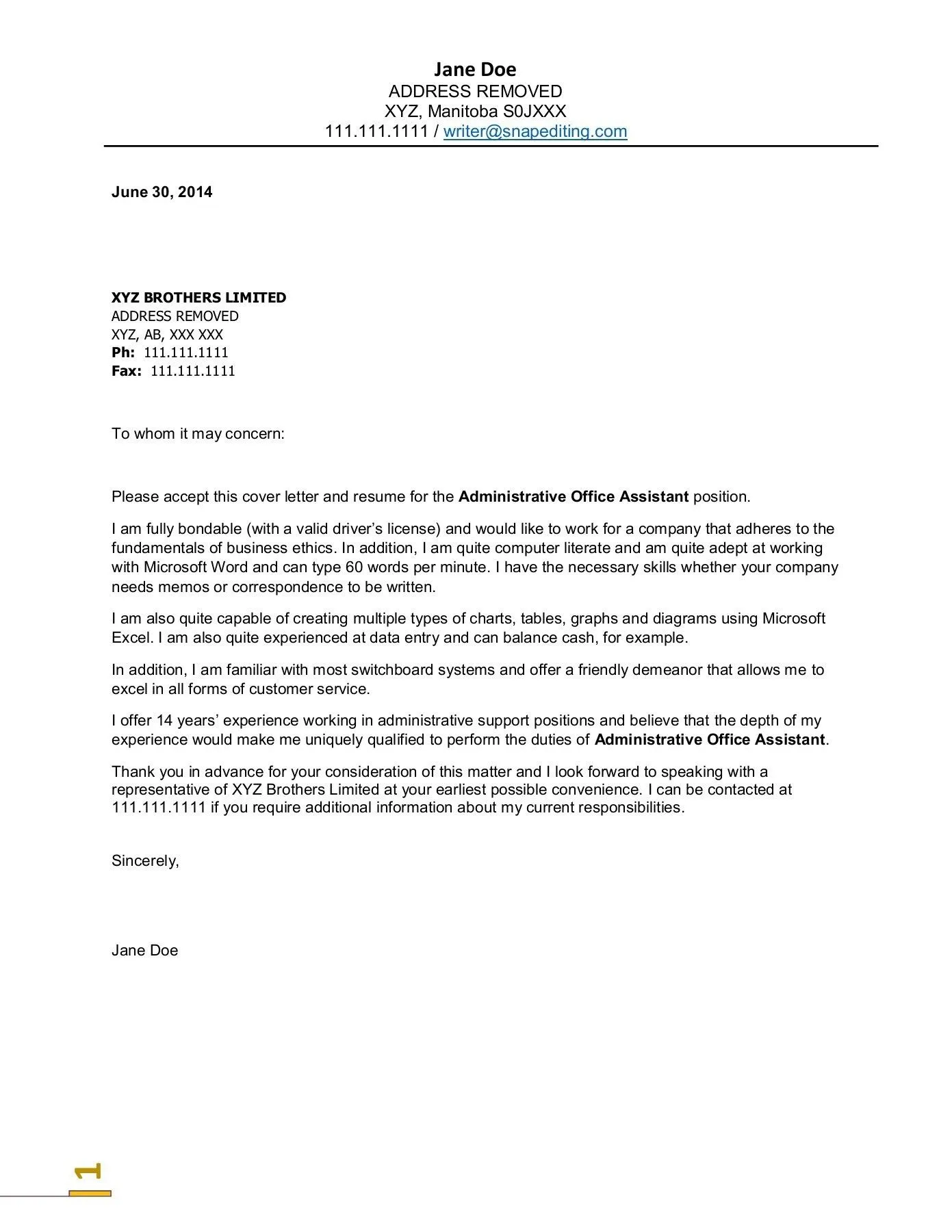
In today’s digital landscape, technical proficiency is increasingly important for office assistant roles. In your cover letter, specify the software programs you’re proficient in, such as Microsoft Office Suite (Word, Excel, PowerPoint, Outlook), customer relationship management (CRM) systems, or any industry-specific software. Describe your experience with data entry, database management, and other technical tasks. Be specific; for example, you could state that you have experience using a particular accounting software to process invoices and track expenses. Be sure to tailor the software skills you highlight to match the requirements listed in the job description. By demonstrating that you possess the necessary technical abilities, you showcase your capacity to contribute effectively to the company’s operations from day one.
Formatting Your Office Assistant Cover Letter
The format of your cover letter is as important as its content. A well-formatted cover letter demonstrates professionalism and attention to detail, making it easier for the hiring manager to read and understand your qualifications. A poorly formatted letter can lead to a negative first impression. Make sure your cover letter is easy to read. Using clear fonts like Times New Roman or Arial, a font size between 11 and 12 points, and ample white space will make it easier for the reader to focus on your content. Maintain a professional tone throughout, avoiding slang or casual language. Proofread your letter carefully to avoid any grammatical errors or typos, as these can diminish your credibility. A well-formatted cover letter underscores your professionalism and respect for the recipient’s time.
Header and Contact Information
Your cover letter should begin with a clear and concise header. Include your full name, address, phone number, and email address. It’s important to ensure that your contact information is up-to-date and professional-looking; avoid using an unprofessional email address. The header allows the hiring manager to quickly identify you and easily reach out. The header should be at the top of the page, typically left-aligned. After the header, include the date, followed by the hiring manager’s name (if known), their title, and the company’s name and address. Double-check all details to ensure accuracy. This formal introduction sets a professional tone for the rest of the letter and displays your attention to detail.
Professional Salutation
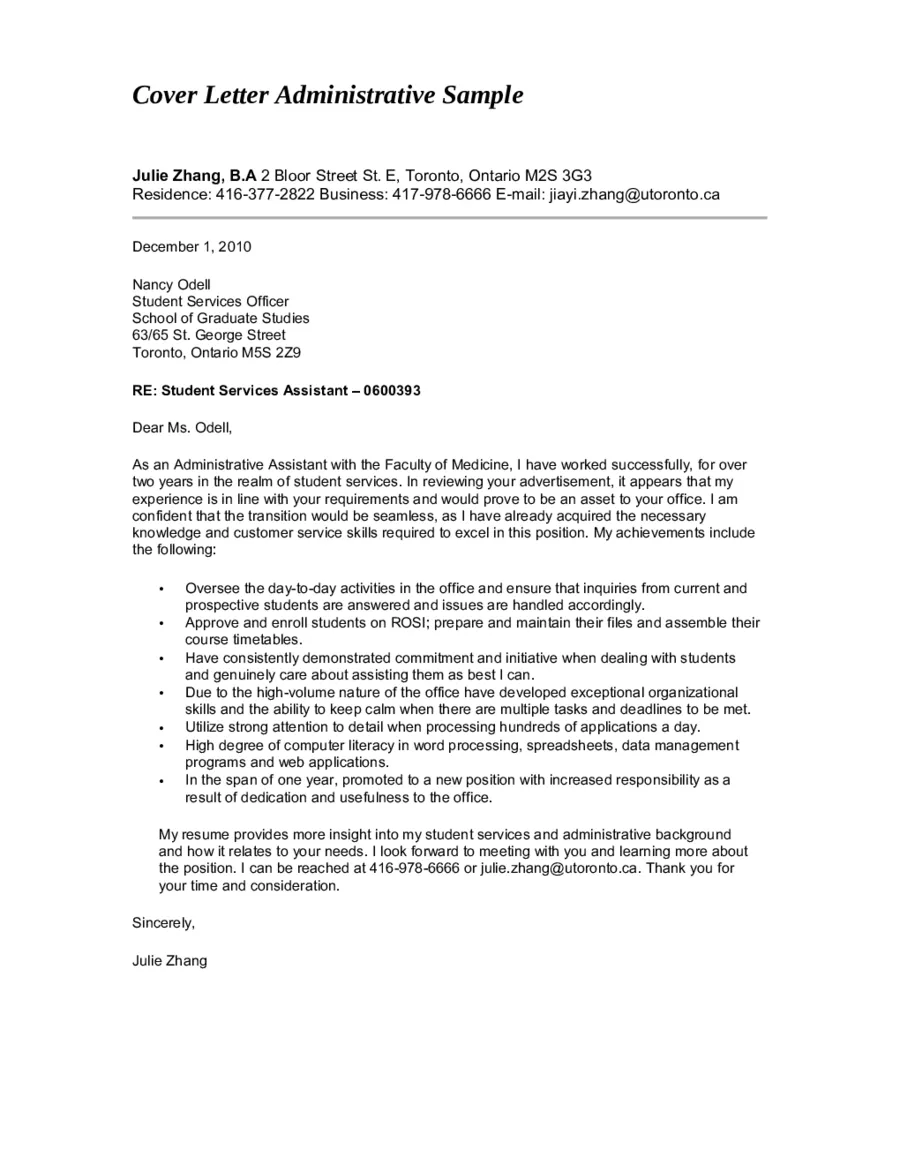
Choose a professional salutation to start your cover letter. Ideally, address the hiring manager by name. ‘Dear Mr./Ms. [Last Name]’ is a standard choice. Research the hiring manager’s name before you begin writing. Using a name demonstrates that you have taken the time to learn about the company and make a personal connection. If you cannot find the hiring manager’s name, use a professional alternative like ‘Dear Hiring Manager’ or ‘Dear [Company Name] Hiring Team’. Avoid generic greetings like ‘To Whom It May Concern,’ which can make your letter seem impersonal. The salutation sets the tone for your letter and can influence the reader’s initial impression.
Writing the Body of Your Cover Letter
The body of your cover letter is where you showcase your skills, experience, and enthusiasm for the office assistant position. This section must be concise and engaging. The body typically consists of three to four paragraphs, each serving a specific purpose: the first paragraph to grab attention, the second to highlight your skills, and the third to express your enthusiasm and explain why you are an excellent fit for the role. By structuring your cover letter with these elements, you create a compelling narrative that resonates with the hiring manager. Take your time and carefully formulate the content of each paragraph to communicate effectively and make a strong impact. The main goal is to create a narrative that emphasizes your value and commitment.
First Paragraph — Grab Their Attention
Your first paragraph should capture the reader’s interest immediately. Start by stating the position you are applying for and where you found the job posting. It is essential to mention the role directly and specify where you saw the advertisement to ensure clarity. Then, briefly state why you are interested in the company or the position, and highlight a key skill or achievement that makes you stand out. Avoid generic phrases; instead, craft a personalized statement that showcases your enthusiasm. Consider mentioning a specific project you admired or an aspect of the company culture that appeals to you. This personalized approach creates a strong first impression and motivates the hiring manager to read on. It must be concise and to the point.
Second Paragraph — Showcase Your Skills
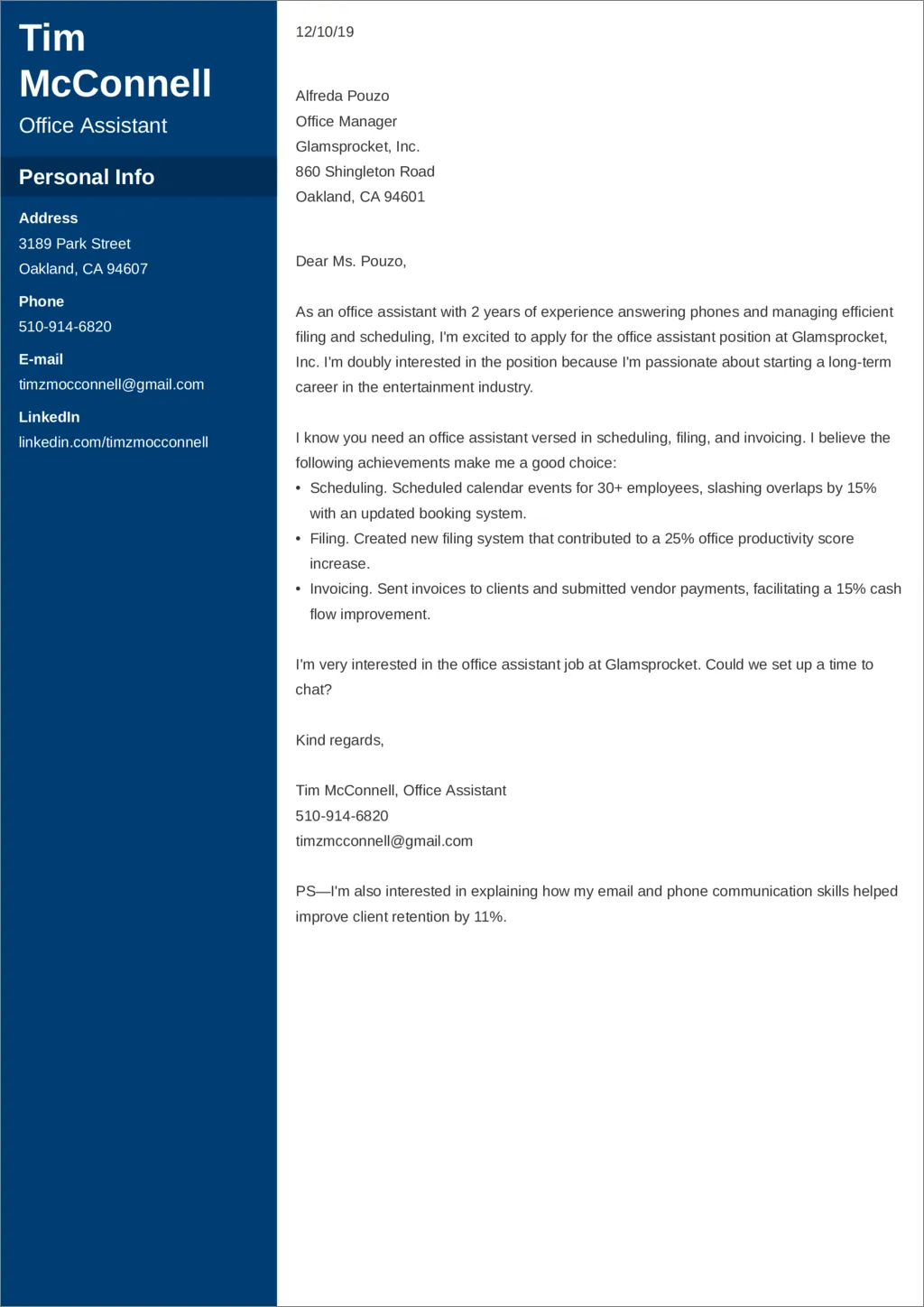
In your second paragraph, demonstrate how your skills and experience match the job requirements. Review the job description carefully and identify the key skills and qualifications the employer is looking for. Provide concrete examples of how you’ve used those skills in previous roles. Use the STAR method (Situation, Task, Action, Result) to structure your examples and illustrate your accomplishments. Describe the situation, the task you were assigned, the actions you took, and the positive results you achieved. Quantify your achievements whenever possible to demonstrate the impact you made. For instance, you might mention how you streamlined a filing system, reducing retrieval time by a specific percentage. Tailor your examples to address the specific needs of the employer to show your capacity to succeed as an office assistant.
Third Paragraph — Express Enthusiasm
The third paragraph is where you express your genuine enthusiasm for the position and the company. Clearly state why you are interested in the specific office assistant role and what attracts you to the company. Show that you have done your research by mentioning specific aspects of the company’s mission, values, or recent achievements that resonate with you. Connect your career goals with the opportunity to contribute to the company’s success. Explain how you see yourself growing within the organization. This paragraph is your chance to showcase your personality and illustrate how your values align with the company’s. It’s essential to be sincere and enthusiastic, ensuring that your passion for the opportunity shines through in your writing. The main goal is to convince the hiring manager that you are not just qualified, but also a great fit for the team.
Concluding Your Cover Letter
Your concluding section must summarize your interest in the position and indicate your next steps. This is the end of your narrative. A strong conclusion can reinforce your professionalism and increase your chances of securing an interview. To finish strong, it’s crucial to ensure that your conclusion is as effective as your introduction. The conclusion provides the final opportunity to leave a lasting positive impression on the reader and make it clear that you are enthusiastic about the opportunity. A carefully crafted conclusion reinforces your value and commitment to the hiring manager.
Formal Closing and Signature
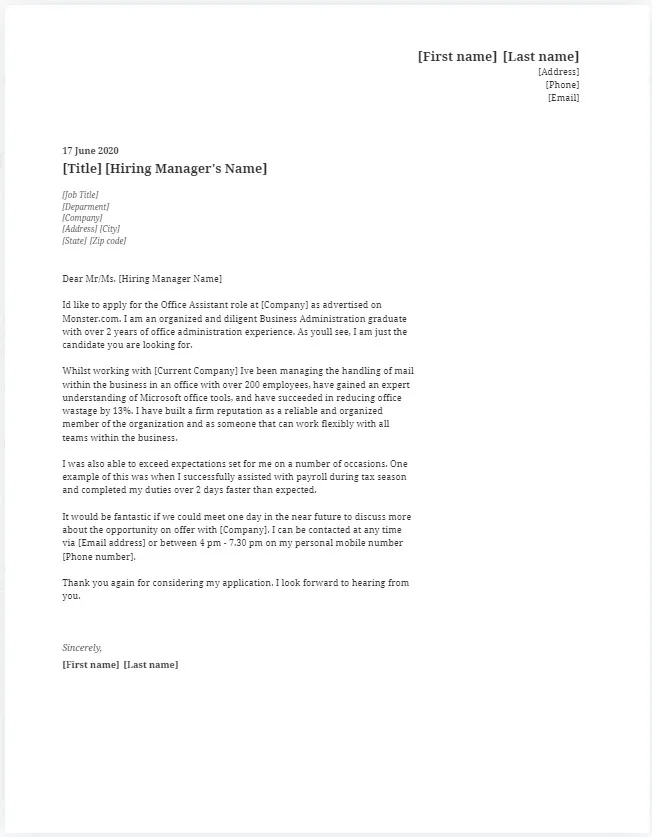
The formal closing of your cover letter should be professional and courteous. Use phrases like ‘Sincerely,’ ‘Best regards,’ or ‘Thank you for your consideration.’ Then, leave space for your handwritten signature, and type your full name below. If you’re sending a digital cover letter, you can simply type your name. Ensure that your signature is legible and professional. Your closing and signature are the final elements of your cover letter, representing a courteous and professional end. These aspects are important to maintain the professional tone and impression you have created.
Proofreading and Editing Your Cover Letter
Before submitting your cover letter, it’s essential to proofread and edit it meticulously. Errors in grammar, spelling, or punctuation can undermine your professionalism and make you appear careless. Review your letter several times, checking for any mistakes. Consider having a friend or colleague proofread it for you. A fresh pair of eyes can often catch errors you might have missed. Pay close attention to sentence structure, clarity, and flow. Ensure that your letter is well-organized and easy to read. A polished cover letter reflects your attention to detail and dedication to quality. Take the time to refine every detail to make sure your skills and qualifications shine.
Common Mistakes to Avoid in Your Cover Letter
Several common mistakes can diminish the impact of your cover letter. Avoid using generic templates that lack personalization, as these can show a lack of effort. Do not simply restate your resume; use the cover letter to provide context and elaborate on your skills. Refrain from including irrelevant information that does not relate to the job requirements. Avoid negative language or discussing your weaknesses. Also, it is crucial to avoid typos and grammatical errors. Finally, do not exceed the recommended length of one page. Addressing these common pitfalls helps to enhance your chances of making a positive impression.
